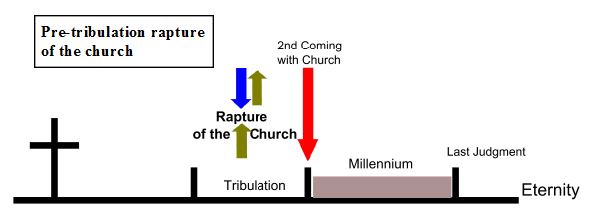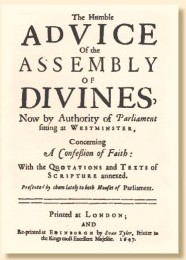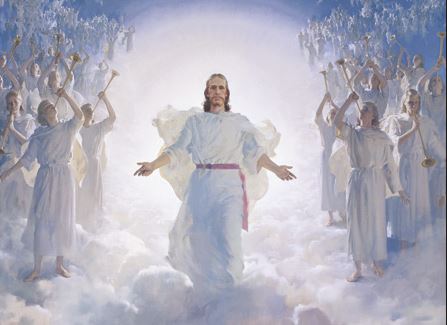 Related Articles
Related Articles
|
|
|
 Websites
Websites
|
|
|
|
|
Covenant Theology and Dispensationalism
Two contradictory and competing 'systematic theologies' have been, and remain very influential in shaping Christian belief and action.
 Note: The 'response' facility relating to this article is available to (logged on) site members only. Note: The 'response' facility relating to this article is available to (logged on) site members only.
Preface
The following article is a modified extract from an earlier article entitled 'A Covenant-keeping God'. The latter, which contains an overview of the major Biblical covenants, is itself part of a 'Drilling Down' series of articles (a 'work in progress').
-----------------------
Foreword:
Theological constructs;
frameworks of interpretation
(aka Systematic Theology)
REGARDING interpretational systems and frameworks or – to use the fancy term – hermeneutics, it is important to note the distinction between terms which are ‘theological’ and those which are ‘biblical’. Theological terms need to be treated with great caution.
Whilst they might be convenient in the discussion of key biblical themes and concepts (e.g. the term ‘Trinity’ as used in reference to the triune Godhead) these are essentially – in the grand sweep of history – neologisms.
They are essentially religious rather than biblical terms or, to use another word, ‘inventions’. They are often lacking clear definition and, across the Christian spectrum, experience differing levels of (dis)agreement and common understanding.
An example is the word ‘sacrament’. It is not found in the Bible and theologians have differed regarding the precise nature of a ‘sacrament’ and also what is (and isn’t ) covered by the term. (See New World Encyclopedia on the subject.) And the different opinions are not confined to the clichéd Roman Catholic/Protestant divisions. The Reformers Luther and Zwingli were famously in disagreement over Communion.
It is also important to differentiate between inductive learning and deductive reasoning. The former derives a view directly from (out of and formed by) the Bible text (exegesis): the latter is arrived at by a process of logic. For instance (and only for the sake of illustration) if it is held that God predestines some to salvation, then logic should dictate that God must, by extension, predestine some to a lost eternity. The use of logic can produce doctrines that are arrived at by eisegesis (reading into a Bible text from a particular and pre-suppositional theological framework).
Clever murder mysteries use 'deduction' to lead the reader or viewer on a false trail and to suspect the wrong person of the crime. (But of course Hercule Poirot's incisive and 'out-of-the-box' thinking shames the logic of we armchair sleuths every time.)
This is not to detract from the benefits of Systematic Theology which (in plainer language) is merely a themed approach to Bible study, but rather to highlight that theological suppositions should never be placed on a par with or, infinitely worse still, sit above the Word of God.
------------
Introduction
Two major theological systems -
(which contradict each other whilst also failing the Berean test: Acts 17:10-11).
 Caveat: Whilst focussing on particular interpretations, this is an 'equal opportunities' document in that it offers scope for upset right across the theological spectrum. Caveat: Whilst focussing on particular interpretations, this is an 'equal opportunities' document in that it offers scope for upset right across the theological spectrum.
In the Christian community across the world there are a variety of theological positions. However two of these have gained widespread support and – whilst disagreeing with one another – have both been highly influential in the formulation of belief. And it is important to stress again that these are theological constructs. The earliest of the two has been termed ‘Covenant Theology’ (mainly formulated and codified in the 17th century; see Footnote): the other being ‘Dispensationalism’ (with its origins in the 19th century).
The former is a central plank within Presbyterian churches around the world and across the (Presbyterian) denominational spectrum. The latter originated in the UK (pioneered by those within what became the Plymouth Brethren), but crossed the Atlantic to become hugely influential in the late 19th century. Dispensationalism informed the belief of the pentecostal churches at the start of the 20th century and has, since then, expanded both denominationally and geographically.
Covenant Theology

Covenant Theology (CT) developed two principal terms to describe its dual covenant interpretational framework viz. a Covenant of Works and a Covenant of Grace. (Some argue that there is only one covenant – the Covenant of Grace. Others include a Covenant of Redemption between the Father and the Son.) These theological terms have been employed to develop a whole range of doctrines and, because of the influence that they have had, we will (d.v.) come back to these later in more detail.
However, for the moment and with reference to the most common 'dual-covenant' view – developed first by Dudley Fenner, an English Puritan, in 1585; and then Scottish theologian Robert Rollock (1555 - 1598) – it is sufficient to say that the (theological) Covenant of Works is used to denote the period prior to the Fall in the Garden of Eden. In simple terms the Covenant of Works would say: “If Adam and Eve had obeyed the instructions given to them then they would have been OK. “ However Adam and Eve didn’t, so God had to embark on Plan B – the Covenant of Grace.”
This term – again simply speaking, but remembering that it is a theological expression, not a biblical, one – covers the continuous period from the Fall until the final consummation and Kingdom come.
However this span of time is (it is argued) split into two ‘administrations’ (again a non-biblical term); basically delineated by the Old Testament (OT) and the New Testament (NT) periods. In these two ‘administrations’ (it is said) God applied the same principles but in two different situations and in two different ways to the one people of God. These were Israelites in the OT and believers (Gentile and Jewish) in NT times.
Whilst this is a convenient hermeneutic, it is not biblical. The nation of Israel was in effect a theocracy within which some were in communion with God (cf Heb. 11) while others were very obviously not. In contrast the church (in the true sense of the bride of Christ) comprises solely of people in blood-bought communion with God.
So 'OT Israel = OT expression of church' is both overly-simplistic and grossly misleading . As a corollary, 'Church = Israel' is also untrue. (More on this below.) But as Covenant Theology has been widely accepted as ‘biblical’ it has led directly to (for instance) infant baptism. Accordingly paedobaptism is claimed to be the NT equivalent of circumcision – even though circumcision was never the symbol of salvation and union with God; and was only ever applied to males. [Again, more on this at later date (d.v.) when looking at 'Who are Abraham's seed?']
One of the other principal, and even more serious, mistakes deriving from Covenant Theology has led to what is commonly called ‘Replacement Theology’. This ‘theology’ – also termed Supercessionism – teaches that the Jews have now been ‘replaced’ by the mainly-Gentile church and (therefore, by deduction and logic) the promises to the Jews have now either all been fulfilled or spiritualised;or will find any contemporary or future fulfillment in the church. (So for instance many older Bibles have chapter headings for Isaiah 59 as “God’s curses on the Jews” and Isaiah 60 as “God’s blessings on the Church”.)
The ‘replacement’ view is most emphatically rejected by Paul in his letter to the (Jewish and Gentile) church at Rome. In fact this is his core message (Rom 11:1-2; 11-12) and the underlying reason for writing this – his longest – letter.
Dispensationalism

In contrast to Covenant Theology the other system of interpretation that has attracted widespread support is that of Dispensationalism.
There is a view that Dispensationalism (as distinct from, but embracing pre-millennialism) has its genesis in a Scottish believer (Margaret Macdonald; 1815-1840) and a Church of Scotland minister (Rev. Edward Irving; 1792-1834). What is undisputed is the fact the John Nelson Darby (founder of the Plymouth Brethren as a distinct grouping with its roots in the wider Brethren movement) is the latter-day father of this theological system. Darby took his pre-tribulation rapture teachings (the removal of believers from the earth prior to the return of Christ and before the ‘great tribulation’ of Matt. 24) to America where they were enthusiastically embraced by a lawyer called Cyrus I. Scofield (1843-1921).
Scofield in turn produced the Scofield Reference Bible (first published 1909) which is annotated throughout in support of Darby’s interpretations – especially with reference to eschatology, the end-time prophecies and events regarding Christ’s return. The Scofield Bible has been hugely influential right through to the present day – in America and right around the world. The teachings are now being propagated through the Moody Bible Institute in Chicago, Dallas Theological Seminary, and more than 200 other lesser-known Bible institutes..
Dispensationalism divides history into sections, covering the periods of Innocence, Conscience, Civil Government, the Patriarchs, the Law, Grace (the church age), the Millennium and the final consummation leading to the everlasting kingdom. However, and perhaps because this theological system lacks biblical warrant, there is a range of opinions (disagreement) on how many dispensations there are (varying from three to eight) and where, in history and in Scripture, the dividing lines lie.
But irrespective of the number of dispensations, the agreed assumption is that God has dealt differently with his world and its people in each of these different dispensations. Accordingly then a different hermeneutic needs to be applied to the different portions of Scripture which cover these different periods of time.
What is also generally agreed is that the church age is a parenthesis – a defined interlude – in God’s overall plan of salvation i.e. in the OT is God dealing through the Jews while the NT is the time of the Gentile church until Jesus’s rapture of the saints (with a pre/post/mid-Tribulation rapture range of views) . This will usher in a further period of God again dealing with and through the Jews.
Dispensational teaching has been greatly popularised and adopted through hugely-influential and best-selling books like Hal Lindsey’s ‘The Late Great Planet Earth’ (1970) and the ‘Left Behind’ series of novels by Tim LaHaye. The Left Behind books – the first in the series appeared in 1995 – have sold over 50 million copies, and have been turned into a cinema production. The books are freely available from and often prominently displayed in Christian bookshops.
As stated earlier, the core element of these novels is the ‘pre-tribulation rapture’ which, as already stated, teaches that all Christians will be suddenly and without any warning removed from the earth prior to the return of Christ. (See Footnotes.) However, and apart from the wider Christian community, even within the Brethren camp there was disagreement. George Mueller (of Bristol Orphanage fame) broke with Darby over this issue. The great Baptist preacher C.H. Spurgeon also declared the teaching to be unscriptural. Nevertheless the doctrine has persisted.
In summation...
Both Covenant Theology and Dispensationalism have been and continue to be highly influential in formulating Christian belief, but both are disputed.
Covenant Theology dismisses swathes of end-time prophecy as irrelevant or allegorical, and sees no place in God’s final purposes for the Jews other than (perhaps) a final ingathering as outlined in Romans. In terms of latter-day expectations prior to the return of Jesus, the former implicitly teaches a universally positive response to the Gospel (reading more into Matt. 24:14 than the verse allows; cf Matt 7:14).
Meanwhile, though recognising the prophesied 'time of great trouble' (Dan 12:1; Matt 24; 2 Tim. 3:1-12), Dispensationalism (in pre-tribulation rapture form), teaches that believers will be spirited away, leaving the Jews to face the music of Satan’s final onslaught. (See Footnotes.)
So while the Gentile believers look down from a safe vantage point in heaven (as God's 'heavenly people'), the Jews will be God's latter-day 'earthly people' who will suffer greatly but endure through the Great Tribulation. Within the Dispensationalist view, Matthew 24 (et al) and, for some, Revelation chapters 4 - 19 are seen as only of academic interest – given the belief that the Gentile saints will be in heaven during that period.
Regarding God’s end-time purposes for the Jews, Dispensational Theology cannot get the church and Israel together, whereas Covenant Theology cannot get the church and Israel apart. The former sees the Jews and the church as totally different entities separated by ethnicity and end-time progression, whereas the latter see Israel and the Jews as essentially an earlier expression of the church, differentiated only by two separate and distinct ‘administrations’ of time (OT/NT) in God’s grace. In fact Israel was/is a physical nation comprising the saved and the lost (Rom 9:7), whereas followers of Christ are a spiritual nation made up exclusively of the redeemed (Gal 3:7,8; 1 Pet 2:9).
At the very least it can be confidently stated that because these two systems disagree markedly with one another, they cannot both be completely right. (And it could be argued that in critical issues they are both wrong.) Yet both of these systems have created expectations and assumptions which could leave believers scripturally askew; vulnerable through false hopes; and ill-prepared to understand the times and the purposes of God in our day as the cosmic upheavals preceding Kingdom Come drawn ever nearer.
At the risk of vain repetition, the theological systems of Covenant Theology and Dispensationalism lack Biblical support in major areas of doctrine, theology and eschatology. Moreover they profoundly disagree with each other on very significant points – especially concerning the times preceding the coming again of Christ; the place of, and God’s purposes for the Jewish people; and the establishment of His everlasting kingdom.
Footnotes:
1. Pre-Tribulation Rapture of the church as taught by most Dispensationalists. The view held is that Christ will have two comings: the first will be invisible 'for the saints' and the second 'with the saints'.

-------------------
 2. The Westminister Confession of Faith (1644) codifies much of what is described as 'Calvinism' and is subscribed to as a 'Subordinate Standard' by Presbyterian denominations worldwide. 2. The Westminister Confession of Faith (1644) codifies much of what is described as 'Calvinism' and is subscribed to as a 'Subordinate Standard' by Presbyterian denominations worldwide.
The document is predicated on so-called 'Covenant Theology' and contains material which is, in the broad sweep of the formulation Biblical, extra-biblical, and unbiblical representing Truth mixed with error.
It is also deficient in failing to cover some some major biblical themes: making bare mention of the person and role of the Holy Spirit, and with no mention of the Great Commission.
3. The Millennium
 Broadly speaking Reformed (Covenant) theology teaches the Millennium as being a definite period prior to the coming again of Christ at the end of the age. However, the early church believed in a literal Millennial reign of Christ on earth. Broadly speaking Reformed (Covenant) theology teaches the Millennium as being a definite period prior to the coming again of Christ at the end of the age. However, the early church believed in a literal Millennial reign of Christ on earth.
While many today share this view, not all who do are Dispensationlists (i.e. all Dispensationlists are pre-millennial but not all Pre-Millennialists adhere to Dispensationalism). See article The (Coming) Millennium by a Scottish lay preacher and city mission superintendent. |
The Editor, 30/07/2013
|
(page
1
2
3
4
5
6
7
8
9
10
11
12
13)
| |
|
John Ferguson (Guest) |
12/08/2013 20:19 |
I should have said Isaiah 11 teaches there will be
|
| |
|
(Guest) |
12/08/2013 20:58 |
John (Ferguson)
That question that you have just asked; "how can they come with Him if they haven't been taken beforehand", is one of the classic stumbling blocks that Christians apply their human logic to, rather than believing the Scriptures in a plain and literal sense (where it makes the best sense?). I perceive that you are a humble enquirer of the truth, perhaps, if you have time, you could trawl back through the previous postings and may understand what the Bible clearly teaches on this matter.
If I had to apply human logic, I would NEVER,EVER, EVER believe in the virgin birth? What! The Creator of the universe became a helpless babe? I had better keep on track here! So I won't digress.
We go up to meet Him on His arrival (the dead first, remember?-Then we who are alive, at the time of the Day of the Lord), then He will inaugurate His literal millennial reign, that simple, if you could only believe it.
Indeed I often read Isaiah 11, that will COME to pass!
The words of the sweet Psalmist of Israel have come to mind;
I will quote from the KJV, because as usual the NIV will probably lose the sense, as it usually does;
"And he shall be as the light of the morning, when the sun riseth, even a morning without clouds; as the tender grass springing out of the earth by clear shining after rain." 2 Samuel 23.4.
This Coming Day Will be a Glorious 1000 year Day after the darkest night of Israel's history, and what a history?
|
| |
|
Colin Ford (Guest) |
12/08/2013 21:00 |
You have probably guessed, the above comment was from me.
|
| |
|
John Ferguson (Guest) |
13/08/2013 07:56 |
Colin .
It may be logical but it is also scriptural .God removes the church(both Jew and Gentile.Eph 2 vs 14-16) being the bride of Christ.The marriage supper and the beama judgement (judgement seat of Christ) can take place.Then Christ returns with his bride to resume his dealings with nation of Isreal. Then all Israel will be saved Rom 11 v 26
|
| |
|
John Miller |
13/08/2013 09:17 |
John thank you for that concise and biblically correct summation of scriptural truth.
Christ rose and ascended. He is our great forerunner. He is the glorious and unique first fruits, the first begotten from the dead. He ascended into heaven and what belongs to Him in this world, His church, that for which He sold all that He possessed to buy it, is destined in the perfection of God's plan to be taken out of this world where she does not belong to share in His glory. From that position she will return to the earth to share not only in His glory at the Father's right hand in heaven but also in His millennial reign on the earth.
Jesus died, Jesus rose and Jesus ascended. In all things He is pre-eminent but is also a glorious pattern. The church does not belong here although in the wil of God it has its earthly sojourn now in "wilderness surroundings". It's place is in heaven at the side of its heavenly Bridegoom. Thence it will return to be displayed as a fitting consort for the One by whose blood it was purchased.
God's word, God's will, God's ways and God's will are never illogical. They are revealed to us in scripture in a way that is attractive and logical to the Spirit indwelt child of God whose mind has been prepared to receive them. They most certainly are illogical and ridiculous to the ungodly, just as the word of the cross is an offence to the self righteous religious man and utterly foolish to the man who relies on human reasoning.
It is not at all to be wondered at that the unregenerate mind would refuse to accept that bodies which were buried centuries, millennia ago and have long since become dust can be raised, changed glorified and caught up into heaven by Our Great God and Saviour, Jesus.
Colin believes this too, but we clearly think his understanding of the timing of this tremendous happening is a little confused.
|
| |
|
John Ferguson (Guest) |
13/08/2013 09:28 |
Thanks John for setting it out so clearly.it certainly how I understand end end times
|
| |
|
Colin Ford (Guest) |
13/08/2013 10:04 |
Please,gentlemen, one Scripture that teaches a pre tribulation rapture of the Church? Or a Second Coming before the Second Coming?
John (Ferguson), Ephesians 2.14-16 teaches us that the Church is ONE in Christ, and also that He abolished the ceremonial law. (Not the moral law-the Sabbath IS eternal) But what about the first resurrection, before the first resurrection? Or is the "rapture" not a first resurrection? I would really like to know!
Again, as ever I agree with much of what John Miller says in regards of the Saviour, but not about His any moment, imminent Coming.
According to the Scriptures Antichrist MUST come first and after he does his wicked work, the true Christ shall destroy him "with the brightness of His coming". 2 Thessalonians 2.8.
|
| |
|
John Ferguson (Guest) |
13/08/2013 10:32 |
One scripture IThes 4 v17.At his second coming his feet will stand on the Mount of Olives Zechariah 14 v 4.That is certainly not the clouds
|
| |
|
Colin Ford (Guest) |
13/08/2013 14:52 |
John F, or should I say the 2 Johns!
1 Thessalonians 4.17 is THE event which happens immediately before Zechariah 14.4. This happens in the "twinkling of an eye", 1 Corinthians 15.52, at this moment Matthew 24.31 will happen, they are simultaneous.
So the the Scripture that you are erroneously asserting to support a pre tribulation rapture, does indeed usher in the "great and dreadful Day of the Lord" Malachi 4.5.
When we compare Scripture with Scripture, we will see that not only will there not be any "secret", "any-moment", or "imminent" rapture seven years or more before the Day of the Lord, but that the Hope of the Church is NOT an event to be followed by the rise and reign of Antichrist, but by his destruction, and the reign of Christ and His saints on the renewed earth.
But if any doubt exists that the Coming of 1 Thessalonians 4.15-17 will take place at the Day of the Lord, it is removed by the opening verses of chapter 5 of the same Epistle, where the Apostle is STILL speaking of the Second Coming.
This passage does indeed cause much embarrassment to pre trib theologians as they are reduced to unnatural explanations to square it with their theories.
|
| |
|
Editor |
13/08/2013 16:25 |
Colin, I said (asked) earlier (07/08):
>>>>
An earlier post spoke of 'the Day of the Lord'. But when (in the chronological sequence) is that 'Day'? Is it a single day (cf Zech 14:1-9) or does it refer to a span of time?
Is the reference in 1 Thess 5:2 the same event as 2 Pet. 3:10? Are there many different 'Day(s) of the Lord'?
<<<<<
In response you replied:
>>>>
The "Day of the Lord" is the 1000 year or millennial reign.
<<<<
So just for clarity and for the sake of anyone reading these postings, could you say please whether you are using (and referring to) the expression "the Day of the Lord" to mean the span of 1000 years or a particular day (moment in time)?
I am not being pedantic: rather it is important to anyone involved in this discussion as the New Scofield Bible states that the 'Day of the Lord' is an 'event' rather than a period of time and it "will begin with the translation of the Church...." i.e. the invisible rapture.
Whereas Louis Sperry Chafer (another eminent pre-tribulationist and founder of Dallas Theological Seminary) saw the 'Day of the Lord' as being the visible return of Christ. So there is confusion here within the Dispensational camp with one putting the event at the start of Daniel's 70th week and the other at the end.
If the Scofield view is correct then the doctrine of 'any moment rapture' has a very great difficulty in that the Bible speaks of other things happening first i.e. as I wrote earlier:
>>>>
Mal 4:5 speaks of the reappearance of Elijah (or someone in the spirit of Elijah)and also cosmic disturbances BEFORE the 'Day of the Lord' (Joel 2:30,31; Matt 24:29; Acts 2:20)
and only then the visible return of Christ (Matt 24:30; 1 Thess. 4:16-17).
<<<<
As per the beginning of this post, could you please make clear whether you are using the DotL expression to mean the visible return of Christ or the millennial span.
And perhaps those holding to the pre-trib rapture view could say whether they agree with Scofield's or Chafer's view.
Thanks all.
|
(page
1
2
3
4
5
6
7
8
9
10
11
12
13)
|
|
|